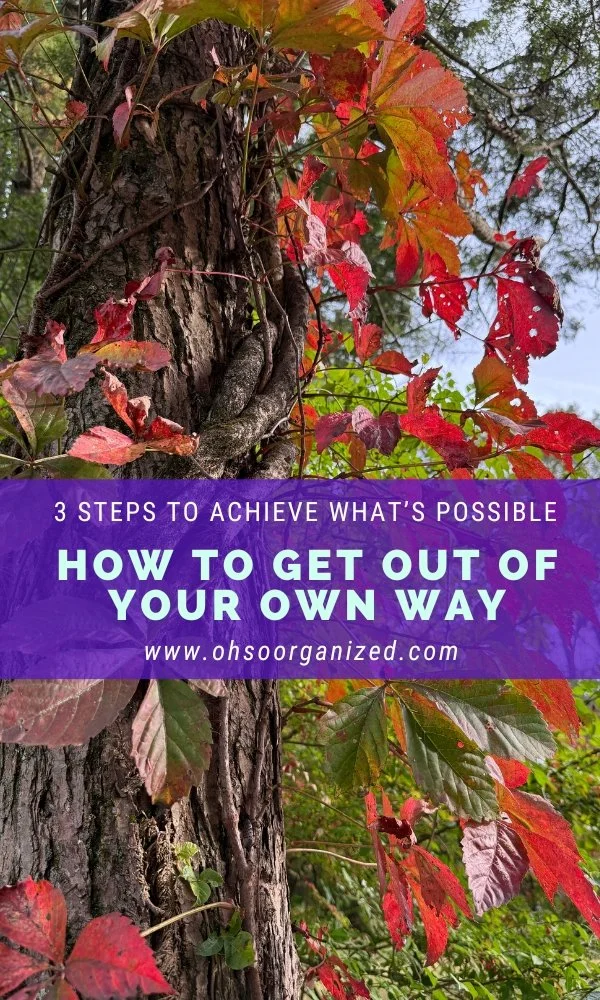The things you say or think can act as possibility-blockers, preventing you from moving forward. They can be subtle or obvious. You might not notice how these phrases get in your way.
The blockers may sound like:
“I can’t do this.”
“It’s too hard.”
“I can’t tolerate the discomfort.”
“I’m just not good at this.”
“I’m unable to figure this out.”
“I don’t know where to start.”
“I don’t have any skills.”
“Nothing ever seems to work out.”
“I’m really frustrated, and I don’t know what to do.”
“I never finish anything.”
“It has always been like this, and I can’t change it.
“I’m feeling totally overwhelmed.”
“Nobody ever taught me how to do this.”
“I can barely get through today, let alone think about tomorrow.”
“I’m stuck where I am.”
“I’m too busy and don’t have time to find a solution.”
“I can’t imagine what’s possible because my mind and space are so cluttered.”
That’s a lot to take in. Have you noticed yourself repeating any of these phrases? Maybe you have different go-to messages that aren’t helping you. Take a moment to identify which thoughts are shutting you down.
What did you find out?
Focusing on negative messages reinforces your lack of agency. You are paying attention to defeat. While you might not be able to eliminate negativity completely, there is hope. In fact, here is a three-step approach that can help. It consists of awareness, reframing, and action.
A Three-Step Approach: Transform the Impossible into Possible
Step 1: Develop Awareness
“The only limits to the possibilities in your life tomorrow are the ‘buts’ you use today.”
Notice the messages that aren’t serving you. Each time you repeat them, those neural pathways in your brain become stronger. The applies to positive messages, too. Becoming aware of your thoughts is the first step in changing them.
Observe and record.
Write down your negative thoughts and messages without judgment.
Make a note of how frequently they ‘visit’ you.
Step 2: Experiment with Reframing
“Take your mind off the problems for a moment, and focus on the positive possibilities. Consider how very much you are able to do.”
Once you recognize which negative messages appear and how often they do, you’re ready for this next step.
When you notice yourself repeating the undesired words, use that as a cue to reframe them. Make a mental or written note. Intentionally craft a statement that reduces the power of negative thoughts and promotes healthier, more proactive messages.
Reframing examples:
“I can’t do this,” can become “I’m learning to do this.”
“I don’t know where to start,” can become “Just start anywhere.”
“Nobody ever taught me how to do this,” can become “I can learn and will ask for help.”
“Nothing ever seems to work out,” can become “The past doesn’t have a hold over my future.”
Step 3: Do Something
“The possibilities are numerous once we decide to act and not react.”
Negative messages can cause doubt and inaction. One way to overcome them is by taking action. After trying out the reframes, you’re ready to move on to this last step.
Ask yourself, “What tiny action can I take to move this project or situation forward?”
Make the action as small and simple as possible. That’s where the real change begins. By doing something, you shift from “I can’t” to “I can.”
Taking action changes your thinking and behavior. It helps you move from feeling stuck to being proactive.
Action also helps you to:
Be more creative when facing challenges,
Build momentum,
Foster a sense of agency,
Achieve your goals, and
Nourish hope.
What Is Possible When You Change Your Message?
You’re human. You’ll have internal and external messages that are negative and unhelpful. However, by learning to acknowledge, reframe, and take action, you can change the course of today and the future. Words and thoughts matter. Are yours supporting or hindering your growth? Change the messages so you can thrive.
Which ideas resonate most with you? I’d love to hear your thoughts. I invite you to join the conversation.
How Can I Help?
Do you feel overwhelmed, stuck, or disorganized? I’m here to help! Virtual organizing is an extraordinary path forward – Local feel with a global reach.
Let’s talk. I’m easy to reach.
Schedule a Discovery Call
Fill out the Contact form
Email me at linda@ohsorganized.com or
Call 914-271-5673
Getting organized and making progress is possible, especially with support.















